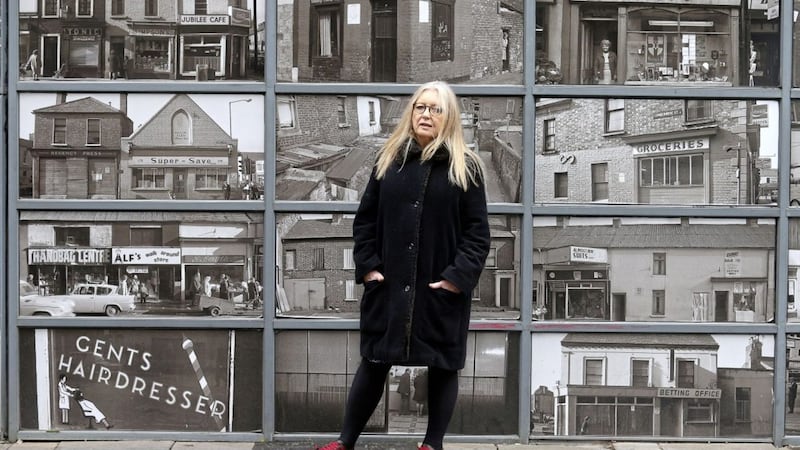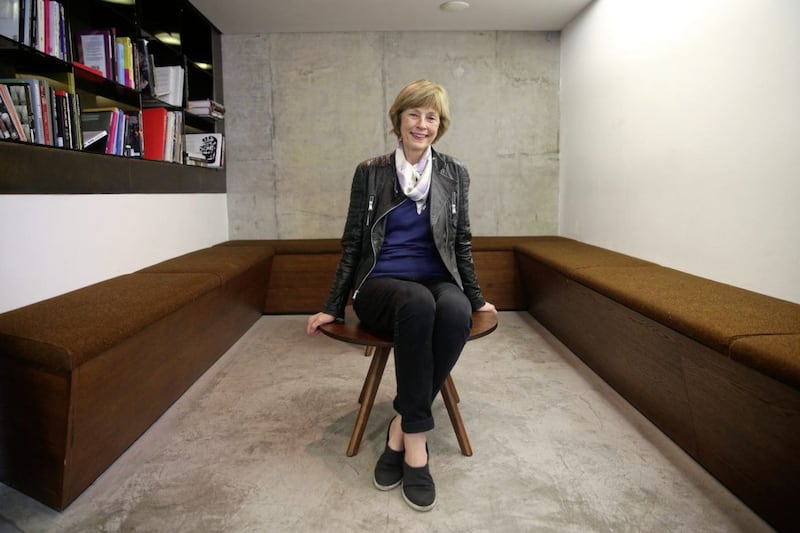IT is with some amusement that author, screenwriter and playwright Anne Devlin surveys the rowdy crowd of schoolchildren scuttling past her on a day away from desks to see Pinocchio at The Mac in Belfast.
It is the place I suggest we meet due to its usual tranquility for early morning coffee but, instead, the venue proves a riotous mnemonic for the award-winning writer who promptly recalls her own early introduction to drama and the theatre.
"I was learning Shakespeare by heart before I did my 11-plus and I never lost the ability to quote Portia's famous 'The Quality of Mercy' speech; it's still in here," she says, patting her chest before flawlessly reciting the oft-quoted lines. "Language is so important and all little children should have trips to the theatre.
"I remember vividly going to my speech and drama classes on a Saturday morning with the late, great May Marrion, a legend in this city. We learned everything, from stage make-up to costumes and it was the best two half-crowns my mother spent each week.
"The classes were in neutral ground in the city centre and Catholic and Protestant children attended. I learned that theatre belongs to everyone and it was an early lesson that always stayed with me."
Panto may be as far removed from the Merchant of Venice as you can imagine, but it is still theatre, nonetheless, and, as Anne Devlin will testify, drama by its very nature is all-encompassing, all-embracing and should never be typecast.
Writers, on the other hand, do tend to discover a niche or genre all of their own and for Devlin, the classification must lie solidly in historical drama with political overtones – in a uniquely Northern Irish way.
Much of her work to date has centred on the lives of Catholic women during the civil unrest of 1969, but it was only when she removed herself from the stress of actually living here herself – she was often out on marches during the civil rights movement era – that she was able to look over her shoulder and write about it from a distance.
In fact, Anne – daughter of the late SDLP founder Paddy Devlin – was only 23 and working as a teacher when she took herself off to Germany with her then partner and penned her first stories in a library, learning German at the same time.
"I left for Germany in 1971 and there is no doubt I was running away," she says. "The stress of all those years of not sleeping properly, the death threats, looking under the car and the constant fear got to me in the end and I didn't want to do it any more.
"I was a Catholic teacher teaching in a Protestant school – the old Bushmills Grammar School – and I needed to remove myself from a terrible sleeping crisis. I needed a peaceful night's sleep and I found that in Germany."
Now aged 65 and back living in north Belfast with husband Chris Parr (producer of the Billy plays) and her 90-year-old mother, Theresa, her perspective has shifted again with a new writing project which has earned her yet another award – an MIA (Major Individual Award) from the Arts Council of Northern Ireland.
Already the winner of the Hennessy Literary Award (1982) for short stories and the Samuel Beckett Award (1985) for TV Drama – she was also the only woman nominated for the Lloyds Playwright of the Year Award for After Easter in 1994 – it has been conferred for her new work, Cornucopia and other stories.
The main title launched in October and focuses on two plaster goddesses which remind the reader that while we can leave home, we can never truly escape. Interestingly, it owes its genesis to a broken statue in the family home, as well as "circling" recollections from Anne's elderly mother captured from pre-Troubles, 1950s Belfast.
Described loosely as a family saga, the overarching theme is "transient global amnesia", with seven additional stories unpacking a larger narrative in which characters and themes from the original story are explored, alongside the question of genre.
She is currently working her way through them and enjoying every minute of a new creative freedom, unrestricted by briefs from others when adapting plays for screen and television.
One of four recipients, she joins jazz musician David Lyttle, dancer Oona Doherty and composer Ian Wilson who are being officially announced this week as this year's MIA winners and for whom the BBC Arts Show (radio) has produced individual short films for each awardee's website.
Recognition is nothing new to the former English and Drama teacher, however, whose 1986 short stories are published by Fabers in a collection entitled The Way Paver.
There have also been numerous screen and stage plays, notably Ourselves Alone, which tackles the effects of the 1981 hunger strikes, and After Easter, which questions religious visions and mental illness.
The Long March, meanwhile, was based on the struggles of the H-Block campaign and "an attempt to tie in a major historical moment with the lives of ordinary people".
Although overtly political, she says she is careful to inject the complete picture into her writing, looking at the entire human condition and, despite serious headlines, always making use of humour.
Today, she is more apolitical than activist and, as a lifelong committed feminist, is infinitely more interested in the women's movement than in her former political dalliance with the Labour Party as a radical Young Socialist.
She is also "fundamentally a European" in the current great Brexit debate, tracing strong remainder credentials back to those seminal years in West Germany.
"I was definitely politically precocious as a teenager," she recalls, "but I have no alignment today and am totally dismayed at the antics of the Labour Party in England.
"Now I have such a different stance to my younger self when I actually thought I was an advance on my father – I had a great relationship with him but we later clashed when I thought he was too nationalist.
"That's just a generational thing, of course, as today, my son Connal, who has a sensible career as a historian in Northumbria University, probably thinks he is an advance on me. Human nature tends to want to improve upon itself."
In that regard then, life mirrors her writing, the start of which Devlin likens to going on a journey in which she "unpacks everything" to unravel meaning and merit.
So, after more than three decades analysing, picking and reflecting, is she pleased with what has been unwrapped?
"Yes, I am proud of my fiction," she asserts on the last sip of coffee now gone cold. "It has been a kind of therapy and has helped me work things out. Each book has been like a knot, a repair job, but I'm not at the end of the journey yet."






